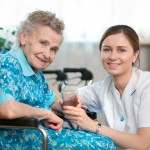
An increasingly elderly population have benefited from improvements in oral health care resulting in the retention of an increasing number of natural teeth. This brings the challenge of maintaining these teeth and their replacements in good disease free condition. However, studies indicate that oral health in this group is often poor. The aim of this trial was to compare different interventions aimed at improving the oral health of older patients living in homes with assisted care.
The participants were randomised to 4 groups;-
- In group 1, (n=26) there was no further intervention over the twelve week study period.
- Group 2 (n=27 )received remotivation from the dentist , after 4 and 8 weeks
- Group 3 (n=26) received remotivation from care staff twice a week following a standard procedure
- In the control group ((n=23), oral hygiene was performed in the usual way, without intervention.
Examinations were performed at baseline and at after 2, 6, and 12 weeks by one author blinded to the allocation. All participants had professional cleaning of teeth and dentures and individually specific advice on oral hygiene measures for teeth and dentures .Participants received a tooth brush and a denture brush, toothpaste, mouth rinse, and an information brochure on oral and denture hygiene. The control group received professional cleaning of teeth and dentures at the end of the study. The main clinical outcomes were mean plaque, gingival bleeding, and denture hygiene indices. Three years after the end of the study, all the clinical indices were again recorded to obtain information about the sustainability of the intervention
The mean age of the participants was 80.8 years, 78.4% (80/102) were female. And they were taking on average five (SD 3.8) drugs. Sixty-nine participants had at least one own tooth remaining (32.4% edentulous), and 89 wore some type of removable denture. The mean number of teeth for participants was 8.3 (SD 8.8); 12.4 (SD 8) if the edentulous participants were excluded.
Compared with controls, denture hygiene, plaque, and gingival bleeding indices were significantly lower in the intervention groups over a twelve-week period (mixed model for repeated measurements; P < 0.023).
Estimates of effects between control and each treatment group were comparable among the three therapy groups; however, even though two of the groups received further help and instruction.
Long-term follow-up showed that all indices were significantly worse than at the last study recall (P < 0.001).
The authors concluded
Professional cleaning of teeth and dentures, with individual instruction, can be recommended to improve oral hygiene. However, the effect decreases over time and renewal of the intervention is necessary.
Comment
The increase in interest in the provision of appropriate oral health care for this increasing section of the population in many countries has been recognised but as yet the evidence-based for appropriate care is at a relative early stage of development so this trial is of interest, although relatively small. Recognition of the importance of providing appropriate oral health information for care support staff who support these individuals has been recognised in some quarters and NHS Health Scotland has developed a training support pack for this group ( Caring for Smiles ) which people may find interesting.
Links
Zenthöfer A, Dieke R, Dieke A, Wege KC, Rammelsberg P, Hassel AJ. Improving oral hygiene in the long-term care of the elderly-a RCT. Community Dent Oral Epidemiol. 2012 Sep 29. doi: 10.1111/cdoe.12007. [Epub ahead of print] PubMedPMID: 23020631
NHS Health Scotland – Caring for smiles , A guide for Trainers

[…] Dental Elf – 9th Oct 2012 – Professional oral hygiene interventions and follow-up suppor… […]